Meet the Explorers
PIs & Collaborators
Sandra Brooke, Ph.D - Chief Scientist
FSU Coastal & Marine Laboratory
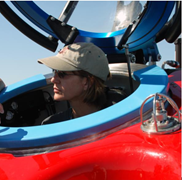 Brooke's primary research is on coral reefs from shallow waters to the deep sea. Her focus is on understanding their distribution, abundance, and physiology, as well as how they are affected by anthropogenic impacts. She has worked on deep-water coral ecosystems in the Aleutian Islands, Norwegian Fjords, South Atlantic Bight, and Gulf of Mexico. Her recent research has focused on the biology and ecology of deep corals and characterization of deep reef ecosystems, particularly to identify sensitive hard bottom habitats such as ecologically valuable coral reefs. Brooke will be working with her team to identify dive sites and collect samples to address the project objectives.
Brooke's primary research is on coral reefs from shallow waters to the deep sea. Her focus is on understanding their distribution, abundance, and physiology, as well as how they are affected by anthropogenic impacts. She has worked on deep-water coral ecosystems in the Aleutian Islands, Norwegian Fjords, South Atlantic Bight, and Gulf of Mexico. Her recent research has focused on the biology and ecology of deep corals and characterization of deep reef ecosystems, particularly to identify sensitive hard bottom habitats such as ecologically valuable coral reefs. Brooke will be working with her team to identify dive sites and collect samples to address the project objectives.
Amy Baco-Taylor, Ph.D. -
Florida State University Department of Earth Ocean & Atmospheric Science
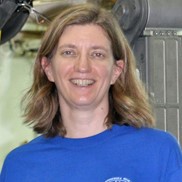 Baco-Taylor's research interests include the evolution, ecology, and connectivity of benthic marine organisms, particularly deep-sea corals. She uses traditional ecological tools alongside advanced genetic/genomic tools to answer basic questions about their ecology, with a goal of informing their management and conservation. Most of this research is exploratory, evaluating species distributions, describing new species, conducting phylogenetic and population genetic studies, and developing habitat suitability models for deep-sea species. She also has evaluated anthropogenic impacts on seamount megafauna. Baco-Taylor has participated in >40 oceanographic cruises in waters of the the Gulf of Mexico, northwest Atlantic, the northeast and southwest Pacific, and the Southern Ocean.
Baco-Taylor's research interests include the evolution, ecology, and connectivity of benthic marine organisms, particularly deep-sea corals. She uses traditional ecological tools alongside advanced genetic/genomic tools to answer basic questions about their ecology, with a goal of informing their management and conservation. Most of this research is exploratory, evaluating species distributions, describing new species, conducting phylogenetic and population genetic studies, and developing habitat suitability models for deep-sea species. She also has evaluated anthropogenic impacts on seamount megafauna. Baco-Taylor has participated in >40 oceanographic cruises in waters of the the Gulf of Mexico, northwest Atlantic, the northeast and southwest Pacific, and the Southern Ocean.
Jeroen Ingels, Ph. D.
FSU Coastal & Marine Laboratory
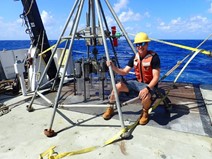 Ingels is a marine ecologist specializing in benthic ecology and biodiversity of meiofauna (microscopic metazoans), particularly nematodes. Investigating how biological characteristics, such as ecosystem diversity, structure and functioning, operate and interact at different temporal and spatial scales under environmental and anthropogenic change, is what drives most of his fundamental and more applied and multidisciplinary research. He has worked on coastal, shelf, and deep-sea habitats (e.g., submarine canyons, seeps, slopes, abyss, oxygen minimum zones) globally. These experiences give him access to the bigger picture, without which the meaning of small-scale discoveries is lost.
Ingels is a marine ecologist specializing in benthic ecology and biodiversity of meiofauna (microscopic metazoans), particularly nematodes. Investigating how biological characteristics, such as ecosystem diversity, structure and functioning, operate and interact at different temporal and spatial scales under environmental and anthropogenic change, is what drives most of his fundamental and more applied and multidisciplinary research. He has worked on coastal, shelf, and deep-sea habitats (e.g., submarine canyons, seeps, slopes, abyss, oxygen minimum zones) globally. These experiences give him access to the bigger picture, without which the meaning of small-scale discoveries is lost.
Steve Morey, Ph.D
Florida Agricultural & Mechanical University, NOAA Center for Coastal & Marine Ecosystems
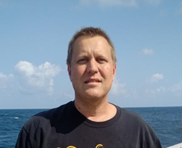 Morey is a physical oceanographer who uses observational data and numerical modeling experiments to study shelf processes, including coastal upwelling and estuarine connectivity, circulation in the Gulf of Mexico, and the interaction between physical processes and marine ecosystems. This includes studies of the connectivity of estuarine systems to offshore environments, impacts of environmental variability on fisheries, deepwater processes over steep topography, and influence of air-sea interactions on the near-surface velocity profile. His models are being used to refine the habitat suitability maps for the study region. He is particularly interested in interdisciplinary approaches, collaborating with researchers in the biological, ecological, meteorological, and computational sciences.
Morey is a physical oceanographer who uses observational data and numerical modeling experiments to study shelf processes, including coastal upwelling and estuarine connectivity, circulation in the Gulf of Mexico, and the interaction between physical processes and marine ecosystems. This includes studies of the connectivity of estuarine systems to offshore environments, impacts of environmental variability on fisheries, deepwater processes over steep topography, and influence of air-sea interactions on the near-surface velocity profile. His models are being used to refine the habitat suitability maps for the study region. He is particularly interested in interdisciplinary approaches, collaborating with researchers in the biological, ecological, meteorological, and computational sciences.
Matt Poti
CSS, Inc., NOAA National Centers for Coastal Ocean Science
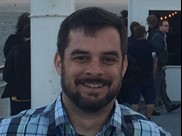 Poti is a spatial ecologist who uses spatial and statistical analyses and modeling of ecological data to inform a wide range of marine resource management and spatial planning priorities. Recently, he has been involved in the development of statistical models that identify areas likely to have suitable habitat for deep-sea corals in the U.S. Atlantic, Gulf of Mexico, and Main Hawaiian Islands. On this mission, Matt will use information from the models and high-resolution bathymetric data to assist with survey planning.
Poti is a spatial ecologist who uses spatial and statistical analyses and modeling of ecological data to inform a wide range of marine resource management and spatial planning priorities. Recently, he has been involved in the development of statistical models that identify areas likely to have suitable habitat for deep-sea corals in the U.S. Atlantic, Gulf of Mexico, and Main Hawaiian Islands. On this mission, Matt will use information from the models and high-resolution bathymetric data to assist with survey planning.
Arliss Winship, Ph.D
CSS, Inc., NOAA National Centers for Coastal Ocean Science
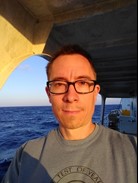 Winship is a marine ecologist who received a B.Sc. in Environmental Biology from the University of Alberta, a M.Sc. in Zoology from the University of British Columbia, and a Ph.D. in Biology from the University of St Andrews. In his 6 years with NCCOS, Arliss has used statistical analyses and computer models of ecological data to inform a wide range of marine resource management applications. Much of his work involves modeling the spatial distributions of marine wildlife including birds and deep-sea corals. On this mission, Arliss will use information from deep-sea coral distribution models and high-resolution bathymetric data to assist with survey planning
Winship is a marine ecologist who received a B.Sc. in Environmental Biology from the University of Alberta, a M.Sc. in Zoology from the University of British Columbia, and a Ph.D. in Biology from the University of St Andrews. In his 6 years with NCCOS, Arliss has used statistical analyses and computer models of ecological data to inform a wide range of marine resource management applications. Much of his work involves modeling the spatial distributions of marine wildlife including birds and deep-sea corals. On this mission, Arliss will use information from deep-sea coral distribution models and high-resolution bathymetric data to assist with survey planning
Michael Martinez-Colon, Ph.D
Florida Agricultural & Mechanical University, NOAA Center for Coastal & Marine Ecosystems
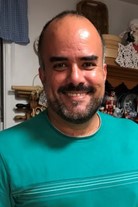 Martinez-Colon's diverse background in geology, oceanography, and micropaleontology forms the cornerstone of his research. Most of his work is field-based with a focus on benthic Foraminifera, ubiquitous single-celled marine organisms (protists) that are the second most important producer of marine sediments, and considered good bio-indicators of human impacts in marine and coastal ecosystems. His research agenda includes experimental culture work of pollutants in liaison with bio-indicators. It aims to develop a multi-level, mechanistic understanding of the fate and trophic transfer of pollutants and their ecological, environmental, and physiological impacts on bio-indicators in coastal/marine systems. He places high value on having a multidisciplinary approach and on his considerable abilities as a trained pastry chef.
Martinez-Colon's diverse background in geology, oceanography, and micropaleontology forms the cornerstone of his research. Most of his work is field-based with a focus on benthic Foraminifera, ubiquitous single-celled marine organisms (protists) that are the second most important producer of marine sediments, and considered good bio-indicators of human impacts in marine and coastal ecosystems. His research agenda includes experimental culture work of pollutants in liaison with bio-indicators. It aims to develop a multi-level, mechanistic understanding of the fate and trophic transfer of pollutants and their ecological, environmental, and physiological impacts on bio-indicators in coastal/marine systems. He places high value on having a multidisciplinary approach and on his considerable abilities as a trained pastry chef.
Students
Adam Alfasso
Florida State University Department of Earth Ocean & Atmospheric Science
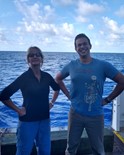 I am a Ph.D. student in the Department of Earth, Ocean and Atmospheric Sciences, studying under Dr. Brooke. My specialty is creating predictive habitat models and predictive spatial and temporal distribution models for target species. These models are used to understand which factors are driving the distribution of the species in question, as well as where your target species is most likely to be, given the environmental conditions you expect to find. For this cruise, that means using these models with high resolution bathymetry and ocean current models to target dive sites where the deep-sea coral communities we wish to sample will probably be. I also assist with ROV and multicore lander deployment and recovery, and data collection in the control van during ROV operations.
I am a Ph.D. student in the Department of Earth, Ocean and Atmospheric Sciences, studying under Dr. Brooke. My specialty is creating predictive habitat models and predictive spatial and temporal distribution models for target species. These models are used to understand which factors are driving the distribution of the species in question, as well as where your target species is most likely to be, given the environmental conditions you expect to find. For this cruise, that means using these models with high resolution bathymetry and ocean current models to target dive sites where the deep-sea coral communities we wish to sample will probably be. I also assist with ROV and multicore lander deployment and recovery, and data collection in the control van during ROV operations.
Ben Brantley
Florida State University Department of Earth Ocean & Atmospheric Science
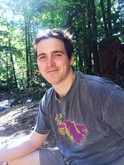 Brantley is currently a Master’s student at Florida State University. He is interested in locating deep sea coral habitats in the Gulf of Mexico and identifying what species are able to thrive in various deep sea conditions in this under-explored region. This information will help to better inform models for locating potential deep sea coral habitats.
Brantley is currently a Master’s student at Florida State University. He is interested in locating deep sea coral habitats in the Gulf of Mexico and identifying what species are able to thrive in various deep sea conditions in this under-explored region. This information will help to better inform models for locating potential deep sea coral habitats.
Gabriella Pantò
University of Gent
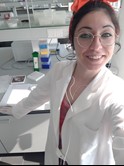 Pantò recently completed her Master's degree in ‘Marine and Lacustrine Science and Management’. The microscopic world hiding in marine ecosystems, its interactions with the surrounding environment and the relation to global climate change is what interests her most, leading her to choose a thesis topic that included meiofauna, particularly nematodes, and the role of these organisms in determining the effects of ice shelf melting on the sediments of the Antarctic region. Onboard the R/V POINT SUR, she will help process meiofauna samples collected in the deep sediments of the West Florida Slope, assisting Dr. Ingels.
Pantò recently completed her Master's degree in ‘Marine and Lacustrine Science and Management’. The microscopic world hiding in marine ecosystems, its interactions with the surrounding environment and the relation to global climate change is what interests her most, leading her to choose a thesis topic that included meiofauna, particularly nematodes, and the role of these organisms in determining the effects of ice shelf melting on the sediments of the Antarctic region. Onboard the R/V POINT SUR, she will help process meiofauna samples collected in the deep sediments of the West Florida Slope, assisting Dr. Ingels.
Queriah Simpson
Florida Agricultural & Mechanical University, NOAA Center for Coastal & Marine Ecosystems
(NOAA-CCME)
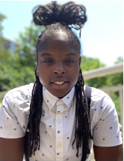 Simpson is a NOAA-CCME graduate scholar at Florida Agricultural and Mechanical University pursuing a Master's degree in Environmental Science with a concentration in Marine and Estuarine Environments. As a student on the NOAA-OER cruise, Simpson wishes to better understand how habitat suitability models can be used to aid in bioprospecting research in areas of the deep sea that host coral and sponge communities. She hopes to obtain an MD-PhD and continue this research to make new medicinal discoveries from deep sea coral and sponge communities.
Simpson is a NOAA-CCME graduate scholar at Florida Agricultural and Mechanical University pursuing a Master's degree in Environmental Science with a concentration in Marine and Estuarine Environments. As a student on the NOAA-OER cruise, Simpson wishes to better understand how habitat suitability models can be used to aid in bioprospecting research in areas of the deep sea that host coral and sponge communities. She hopes to obtain an MD-PhD and continue this research to make new medicinal discoveries from deep sea coral and sponge communities.
Anthony Solguizzo
Florida State University Department of Earth Ocean & Atmospheric Science
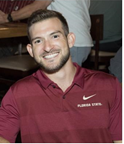 Sogluizzo is a Master's student in Brooke's lab, working with her on several deep sea coral projects. He is broadly interested in coral reef ecology but more specifically in the interactions between shallow-water coral hosts and their photosynthetic algal symbionts (zooxanthellae). Ultimately, he wants to show how corals and their symbiont communities might change in response to climate change. During this cruise, he will be helping document the ROV dives and process samples we collect for genetic and reproductive analysis.
Sogluizzo is a Master's student in Brooke's lab, working with her on several deep sea coral projects. He is broadly interested in coral reef ecology but more specifically in the interactions between shallow-water coral hosts and their photosynthetic algal symbionts (zooxanthellae). Ultimately, he wants to show how corals and their symbiont communities might change in response to climate change. During this cruise, he will be helping document the ROV dives and process samples we collect for genetic and reproductive analysis.

